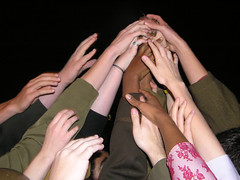Civil Society, Global Governance

The events of the past two years – from Occupy movements to civil unrest and revolutions – have served to reinforce the knowledge that global governance has new paramount actors. The primacy of regular people has never been so clear, with globalisation and technology only serving to amplify the influence of the individual, and of its plural, ‘civil society’.
It is civil society – individuals, groups, professional associations and non-governmental organisations – who increasingly demonstrate the energyEnsuring universal access to sustainable, dependable, and affordable energy is critical to every aspect of prosperity. Increasing public oversight and transparency in the energy sector can help to ens... More, creativity and influence needed to strengthen democracies and accelerate development across the world. But in spite of this knowledge – or, perhaps, because of it – some policymakers and governments greet civil society with a degree of suspicion and contempt. This is especially true in fragile democracies and developing countries, when dissent or civil action is seen as hostile and even treasonous.
These and other tensions – including political interference, lack of resources and inadequate opportunities to influence policymaking – were raised at the Royal Commonwealth Society in London last week, when the charity hosted an event with the support of the Baring Foundation, focusing on the role of civil society in the political and economic development of Africa. Rwandan High Commissioner to the UK, HE Ernest Rwamucyo acknowledged that there has been historical discord between some governments and their local civil societies, saying civil society has been perceived to be “confrontational and uncompromising”, adding, “They tend to focus on very narrow interests, championing those at the expense of the bigger interest in society.”
Despite the challenges faced by both governments and civil society organisations in developing countries, they are not antagonistic forces. Yes, sometimes they are counterveiling forces, but at their cores (we hope) both want the same things. The solution, according to David Bonbright, Chair of international citizen action organisation CIVICUS, is trust. “If you really believe that effective indigenous civil society is critical, and if you understand that it takes time for these organisations to become truly effective, you have to pretty much hand over resources without a lot of strings or control over what happens. This turns out to be difficult for people to do.” Difficult? Perhaps. Necessary? Absolutely. As Myles Wickstead CBE said to begin the debate that evening, “The role of civil society will come into increasingly sharp focus as we look at what comes after 2015.”
The expiry date on the Millennium Development Goals is fast approaching, and new development narratives are beginning to emerge. The voice of civil society is getting stronger in the 21st century, and governments would do well to start heeding its call.
Photo Source: Flickr, thanatagoddess
